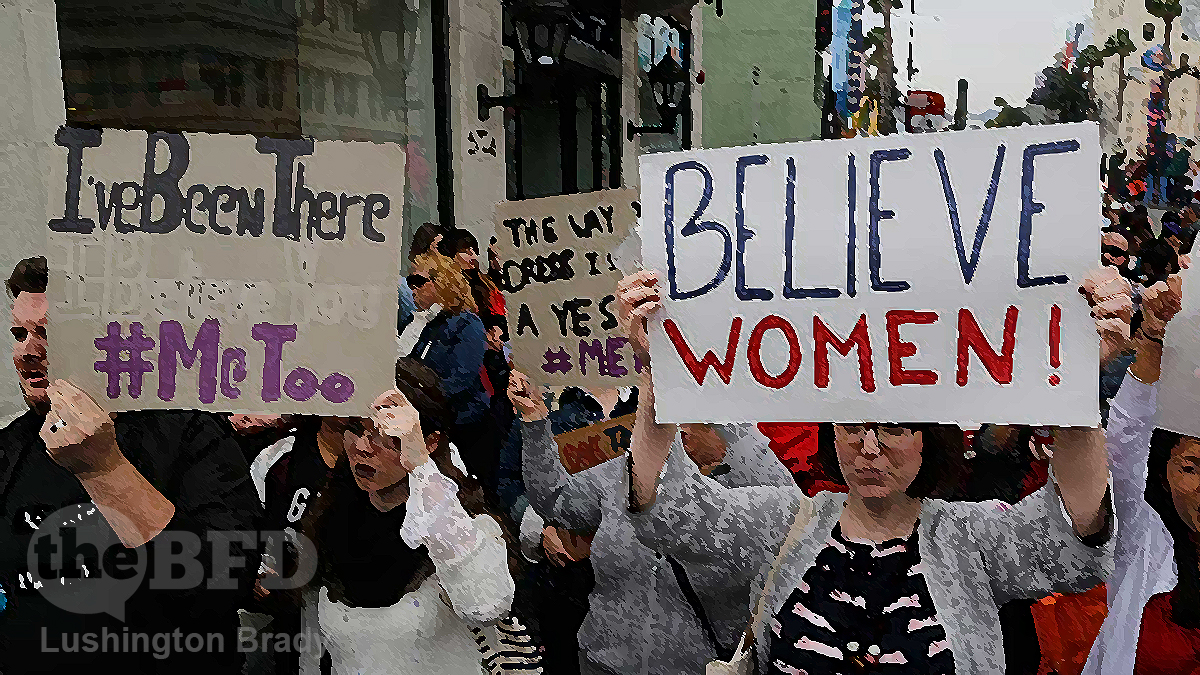Despite what the MeToo harpies would have us meekly submit to, we are under no obligation to #BelieveWomen about rape – or anything.
Before reaching for the smelling salts and the baseball bats, be reassured that this is not a statement of atavistic misogyny. We are under no obligation to believe anybody, about anything, without proof. More importantly, we are obliged not to believe any accusations made against someone, without proof.
We are, after all, supposed to be a society based on reason, science and the rule of law. “Believe women” contradicts all three.
In the first place, it is a basic rule of logic that Onus probandi incumbit ei qui dicit: “Proof lies on him who asserts”. That is, when someone makes a claim, it is incumbent on them to prove it.
Of course, in our daily lives, we accept many claims without evidence. For instance, if a friend asserts that it’s raining, we are generally inclined to reach for an umbrella without first rushing outside to check. On the other hand, if we are told that it’s pelting down hailstones strong enough to smash windows and knock people unconscious, we’d almost certainly want to see for ourselves. Doing so is not to say that the other person must be a wicked liar, but that such a phenomenon is so extraordinary that we are hardly likely to accept it without some kind of proof.
The burden of proof in science is the reason that the Royal Society’s motto is Nullius in verba, or “Take nobody’s word for it”. The Society’s motto reflects the fundamental scientific principle that claimants must provide evidence.
In general, the stronger the claim, the stronger the standard of evidence required. As Carl Sagan put it, “extraordinary claims require extraordinary evidence”.
Rape is surely as extraordinary a claim as can be made. Despite the mendacious “statistics” peddled by some feminists, rape is really quite a rare phenomenon, at least in most Western countries – as are most crimes of violence. Of course, some Western countries buck the trend and pockets of shocking crime persist within otherwise law-abiding, safe countries.
But the point remains that, in the West at least, rape is regarded as a particularly heinous crime. The evidence of this is the public furore which often greets rape cases. Even in the case where the accused rapist is proven innocent, the stigma of the accusation is so persistent that their careers, relationships and even lives are often ruined – for years, if not for good.
So, rape is an extraordinary claim, which demands an attendant high level of proof.
Indeed, the devastating consequences of an accusation of rape, or any crime, are, along with the basic logical principle of burden of proof, the reason that the presumption of innocence is an absolute principle of our rule of law. The presumption of innocence is the “golden thread” that runs “throughout the web of the [Common] Law…No matter what the charge or where the trial, the principle [is] that the prosecution must prove the guilt of the prisoner”.
The claim that we must “believe women” runs completely counter to the presumption of innocence and the burden of proof.
If we “believe women” – all women, without question – we are explicitly accepting their claim without proof. “Believe survivors” is even worse, because calling someone a “survivor” explicitly endorses without proof the claim that they have “survived” a crime.
None of this is to argue that we should never believe women. But, rape being such a serious crime as our laws and society clearly regards, we must demand a concomitantly high level of proof.
Yet, many politicians and activists, male and female, demand that we ignore every principle of logic and law, and believe women without question. Greens politician Larissa Waters furiously tweeted that “WOMEN DO NOT LIE ABOUT BEING RAPED”, but no amount of caps-lock rage can alter the fact that that is demonstrably untrue. While the rate of prosecution for false accusations of rape is relatively low – studies estimate anywhere between 2% and 10% – that is much higher than the rate of false accusations for other crimes. So some women lie about rape – and they lie about it much more than people lie about other crimes.
But “some women” is not “all women”. So, of course, not all women lie about rape – and only the most egregious misogynist would claim otherwise. But the inescapable corollary of that is that not all women tell the truth about rape, either. It is just as illogical to always, without question, “believe women” as it is to never believe women, no matter what the evidence
People lie, male and female. Not just about rape, but about anything and everything. Not all people, but enough that we naturally guard against undue gullibility – and regard truthfulness as one of the highest virtues.
It’s to protect ourselves against the harmful consequences of mendacity that we have developed a pretty good set of principles for winnowing the liars from the honest. Not least to protect the genuinely wronged from the equally harmful consequences of being disbelieved.
We abandon those principles at our peril and at the risk of enormous harm to both the innocent and the wronged.
Please share this BFD article so others can discover The BFD.

